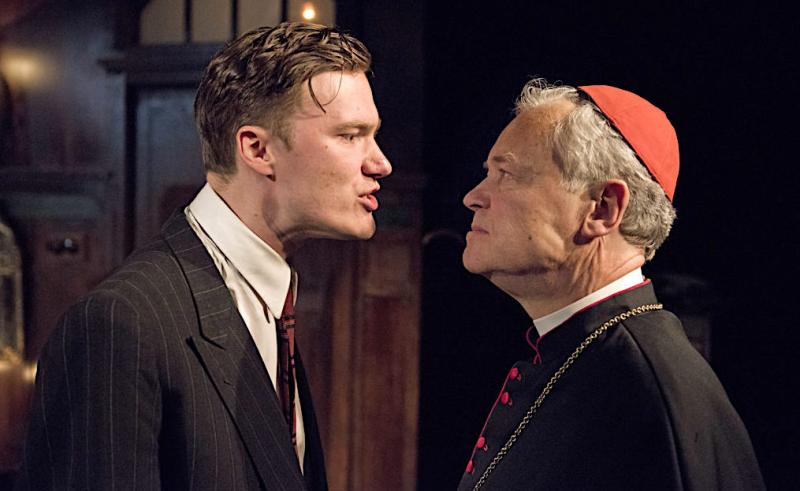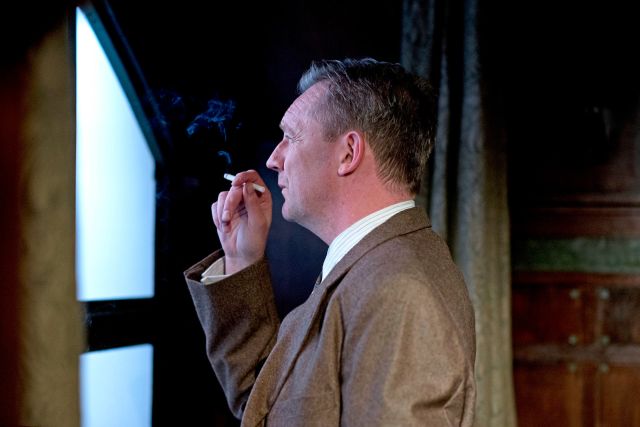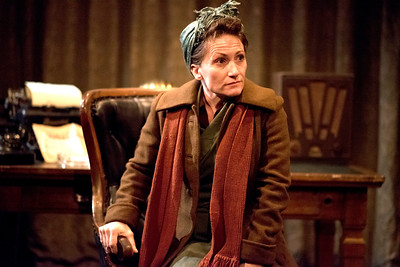All Our Children review - shameful historical period horrifies anew | reviews, news & interviews
All Our Children review - shameful historical period horrifies anew
All Our Children review - shameful historical period horrifies anew
Stephen Unwin's debut play explores Nazi Germany and eugenics

How do you tell a story as complex as the eugenics movement, which is pursued afresh in writer-director Stephen Unwin's new play All Our Children? Its idealistic origins lie in Britain with Francis Galton in 1883, before leading to forced sterilisation of the disabled in several countries, starting in America in the 1920s and continung in Sweden into the 1970s; its legacy is today’s screening for conditions such as Down Syndrome.
One way is to focus on eugenics’ nadir in Nazi Germany, when mentally and physically disabled children and adults were deemed "lives unworthy of life". Unwin, a seasoned director here marking his writing debut, narrows his focus very tightly indeed, setting his play over the course of one long wintry day, in a fictional hospital near Cologne. From such hospitals, over 70,000 German children and adults were dispatched to out-of-the-way "euthanasia" centres where they were killed by carbon monoxide. Later, the technique was transferred to the gas chambers of the extermination camps, and the genocide that ensued so horrified the world that the Nazis' industrial slaughter of the disabled has never received the same attention. Unwin has sought redress via this claustrophobic chamber piece, with its central character, Dr Victor Franz (Colin Tierney, pictured below), on stage for almost the entire duration. It’s January 1941 and Dr Franz, a middle-aged paediatrician with a worrying cough, is woken by his housekeeper, Martha. Over the next 100 minutes, we never leave his cosy office, with its wood-burning stove and shelves filled with files describing his young patients’ disorders. For the last three months, Dr Franz has been assisted by a zealous Nazi administrator, Eric Schmidt (Edward Franklin); their task is to select which of the hospital's incurable children are to be sent off in the special buses with their whitewashed windows.
It’s January 1941 and Dr Franz, a middle-aged paediatrician with a worrying cough, is woken by his housekeeper, Martha. Over the next 100 minutes, we never leave his cosy office, with its wood-burning stove and shelves filled with files describing his young patients’ disorders. For the last three months, Dr Franz has been assisted by a zealous Nazi administrator, Eric Schmidt (Edward Franklin); their task is to select which of the hospital's incurable children are to be sent off in the special buses with their whitewashed windows.
There’s a fortnightly quota set by head office and an urgency to implement the programme. The Nazi view is that the disabled are "useless eaters"; they use medical resources needed for wounded soldiers; they threaten the procreative health of the German people. Kindly Martha appears ignorant of the patients’ fate, grateful merely that her own children are normal. Schmidt is fanatical and impatient with the doctor, haranguing him when he lacks enthusiasm for the task
Dr Franz is self-medicating with cognac, cigarettes and wine; he’s no ardent evangelist for the eugenic cause, just a banal cog enabling an evil machine. There are occasions when the language used in the dialogue pulls its punches; perhaps it's too hard to inflict the vile Nazi terms used to describe people with disabilities without offending modern sensitivities. One of the most distressing aspects of the "euthanasia" programme was how many families consented to their disabled relatives' murder, hearts hardened by the insidious propaganda of disgust. Unwin brings in a mother who did not consent, Frau Pabst (Lucy Speed, pictured above). She enters Dr Franz's office wanting to see her epileptic son, but it’s not allowed. Speed is outstanding as an uneducated woman who has put her trust in her social superiors; her dawning realisation that she and her son have been betrayed provides the play’s most dynamic scenes. The drama then becomes more obviously didactic with the appearance of David Yelland playing the historic figure, Bishop von Galen, a Catholic aristocrat who denounced Nazi eugenics from his pulpit and in the press.
Unwin brings in a mother who did not consent, Frau Pabst (Lucy Speed, pictured above). She enters Dr Franz's office wanting to see her epileptic son, but it’s not allowed. Speed is outstanding as an uneducated woman who has put her trust in her social superiors; her dawning realisation that she and her son have been betrayed provides the play’s most dynamic scenes. The drama then becomes more obviously didactic with the appearance of David Yelland playing the historic figure, Bishop von Galen, a Catholic aristocrat who denounced Nazi eugenics from his pulpit and in the press.
Unwin has meticulously researched the history and here imagines a fiery encounter between the outraged Bishop, the weak paediatrician and the fanatical young Nazi administrator. Class, religion, morality and the poisonous economic and political legacy of Versailles all inform the debate, which is perhaps tied up a little too neatly at the end. And while it is true that Bishop von Galen’s public condemnation played a large role in ending the gassing of the disabled, their murder continued through starvation, lethal injection and other means in institutions which were in the majority run by Christian organisations. This is a brave and challenging play, admirably staged in the intimate Jermyn Street theatre; it makes for powerful if uncomfortable viewing.
The future of Arts Journalism
You can stop theartsdesk.com closing!
We urgently need financing to survive. Our fundraising drive has thus far raised £49,000 but we need to reach £100,000 or we will be forced to close. Please contribute here: https://gofund.me/c3f6033d
And if you can forward this information to anyone who might assist, we’d be grateful.

Subscribe to theartsdesk.com
Thank you for continuing to read our work on theartsdesk.com. For unlimited access to every article in its entirety, including our archive of more than 15,000 pieces, we're asking for £5 per month or £40 per year. We feel it's a very good deal, and hope you do too.
To take a subscription now simply click here.
And if you're looking for that extra gift for a friend or family member, why not treat them to a theartsdesk.com gift subscription?
more Theatre
 Clarkston, Trafalgar Theatre review - two lads on a road to nowhere
Netflix star, Joe Locke, is the selling point of a production that needs one
Clarkston, Trafalgar Theatre review - two lads on a road to nowhere
Netflix star, Joe Locke, is the selling point of a production that needs one
 Ghost Stories, Peacock Theatre review - spirited staging but short on scares
Impressive spectacle saves an ageing show in an unsuitable venue
Ghost Stories, Peacock Theatre review - spirited staging but short on scares
Impressive spectacle saves an ageing show in an unsuitable venue
 Hamlet, National Theatre review - turning tragedy to comedy is no joke
Hiran Abeyeskera’s childlike prince falls flat in a mixed production
Hamlet, National Theatre review - turning tragedy to comedy is no joke
Hiran Abeyeskera’s childlike prince falls flat in a mixed production
 Rohtko, Barbican review - postmodern meditation on fake and authentic art is less than the sum of its parts
Łukasz Twarkowski's production dazzles without illuminating
Rohtko, Barbican review - postmodern meditation on fake and authentic art is less than the sum of its parts
Łukasz Twarkowski's production dazzles without illuminating
 Lee, Park Theatre review - Lee Krasner looks back on her life as an artist
Informative and interesting, the play's format limits its potential
Lee, Park Theatre review - Lee Krasner looks back on her life as an artist
Informative and interesting, the play's format limits its potential
 Measure for Measure, RSC, Stratford review - 'problem play' has no problem with relevance
Shakespeare, in this adaptation, is at his most perceptive
Measure for Measure, RSC, Stratford review - 'problem play' has no problem with relevance
Shakespeare, in this adaptation, is at his most perceptive
 The Importance of Being Earnest, Noël Coward Theatre review - dazzling and delightful queer fest
West End transfer of National Theatre hit stars Stephen Fry and Olly Alexander
The Importance of Being Earnest, Noël Coward Theatre review - dazzling and delightful queer fest
West End transfer of National Theatre hit stars Stephen Fry and Olly Alexander
 Get Down Tonight, Charing Cross Theatre review - glitz and hits from the 70s
If you love the songs of KC and the Sunshine Band, Please Do Go!
Get Down Tonight, Charing Cross Theatre review - glitz and hits from the 70s
If you love the songs of KC and the Sunshine Band, Please Do Go!
 Punch, Apollo Theatre review - powerful play about the strength of redemption
James Graham's play transfixes the audience at every stage
Punch, Apollo Theatre review - powerful play about the strength of redemption
James Graham's play transfixes the audience at every stage
 The Billionaire Inside Your Head, Hampstead Theatre review - a map of a man with OCD
Will Lord's promising debut burdens a fine cast with too much dialogue
The Billionaire Inside Your Head, Hampstead Theatre review - a map of a man with OCD
Will Lord's promising debut burdens a fine cast with too much dialogue

Add comment